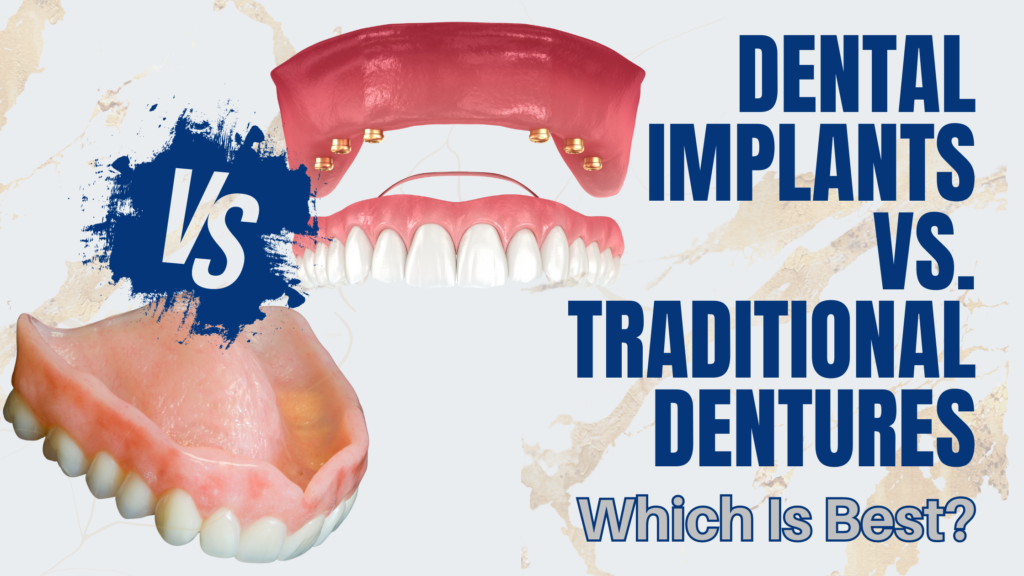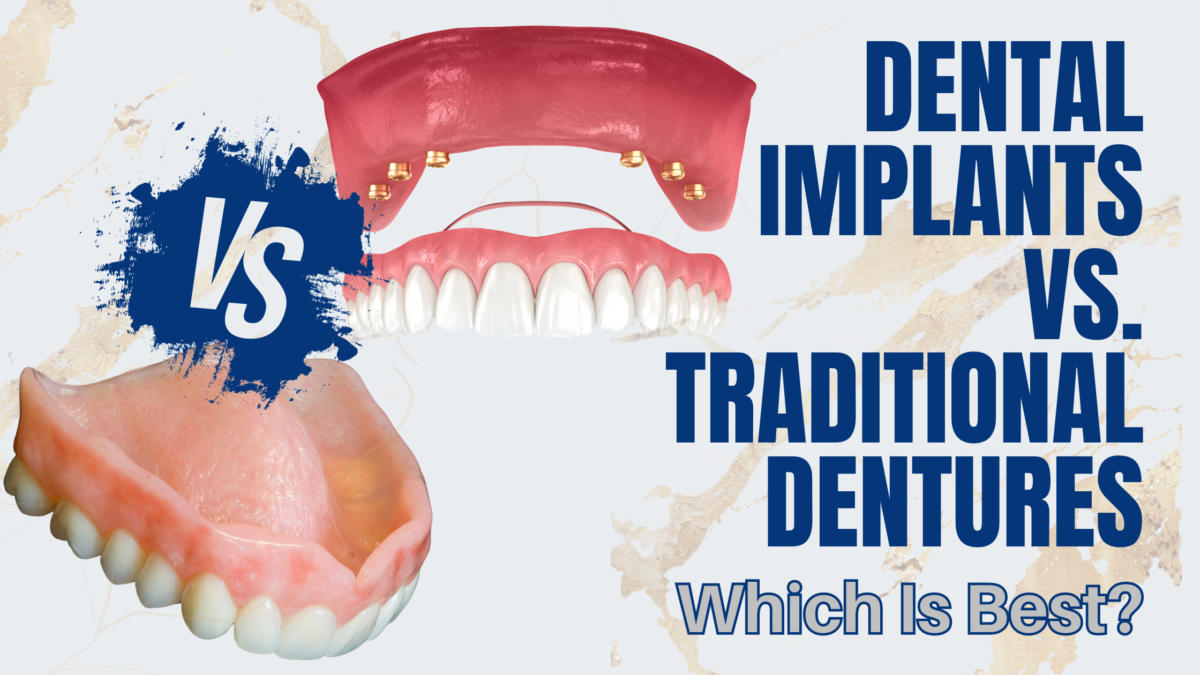Dental Implants vs. Traditional Dentures: Which Is Best?

Created By: Laura Hoover
Dental Implants vs. Traditional Dentures: Which Is Best?
Tooth loss is an emotional and practical challenge, as losing teeth can affect not only your smile but also your ability to eat, speak, and maintain confidence in social settings. The need to replace missing teeth is essential for both functional and aesthetic reasons.
Two primary options exist for tooth replacement: dental implants and traditional dentures. While both solutions aim to restore your smile and improve daily function, they differ significantly in terms of comfort, durability, care requirements, and cost. This article will explore both options in detail, helping you decide which tooth replacement method fits your lifestyle, budget, and personal needs.
1. Understanding the Basics
What Are Dental Implants?
Dental implants are a modern solution to tooth loss. These implants consist of a titanium alloy screw surgically placed into the jawbone. Over time, the implants fuse with the bone through a process called osseointegration, creating a stable foundation for prosthetic teeth that function much like natural teeth.
Key characteristics of dental implants include:
- Permanence: Once placed, implants are designed to be long-lasting, potentially lasting a lifetime with proper care.
- Functionality: Implants mimic natural teeth in both appearance and function, allowing you to chew, speak, and smile confidently.
- Natural Look: Implants are carefully crafted to match the look and feel of your real teeth, providing an aesthetically pleasing result.
What Are Traditional Dentures?
Traditional dentures are removable prosthetic devices used to replace missing teeth. Dentures come in two primary forms:
- Full Dentures: Used when all the teeth are missing.
- Partial Dentures: Used when only some teeth are missing.
Over the years, dentures have evolved in terms of materials and fit. However, they remain a removable, temporary option for tooth replacement, requiring more maintenance and adjustments than dental implants.
2. Comparing Comfort and Fit: Dental Implants vs. Dentures
Comfort with Dental Implants
Dental implants offer unmatched comfort. Because they are securely anchored in the jawbone, they function like natural teeth. This stability means:
- No slipping or movement while eating or speaking.
- Long-term comfort with no need for adhesives or frequent adjustments.
- A natural feel that closely resembles your original teeth.
Comfort with Traditional Dentures
While modern dentures have improved, they can still present discomfort over time. Common issues include:
- Slipping: Dentures may shift in the mouth, particularly when chewing or speaking.
- Discomfort: Dentures can rub against the gums, causing sore spots or irritation.
- Adjustments: Dentures require frequent realignment as the shape of the jaw changes over time, leading to a less secure fit.
3. Durability and Longevity: Which Lasts Longer?
Dental Implants: A Long-Term Solution
Dental implants are renowned for their durability. With proper care, implants can last 20 years or more, and in many cases, they are a lifetime solution. Their strength and resilience allow you to:
- Chew tough foods without worry.
- Maintain overall oral health with minimal risk of wear and tear.
Traditional Dentures: Frequent Replacements
Dentures have a shorter lifespan compared to implants, typically lasting 5 to 8 years before needing replacement. This is due to:
- Wear and tear on the materials used in dentures.
- Changes in the gums and bone structure, which can cause dentures to fit poorly over time.
- The need for refitting or replacing due to these changes.
4. Maintenance and Care: What’s Required?
Caring for Dental Implants
One of the significant advantages of dental implants is that they require the same care as natural teeth:
- Daily brushing and flossing are essential.
- Regular dental check-ups help maintain the health of the implant and surrounding teeth.
- May require initial bite adjustment.
Implants do not require removal or special cleaning solutions, making them low-maintenance.
Caring for Traditional Dentures
Caring for dentures is more time-consuming:
- Dentures need to be removed daily for cleaning.
- Soaking in cleaning solutions is often necessary to maintain hygiene.
- Special attention is required to prevent breakage and avoid bacterial buildup.
- Will require occasional adjustments or relining to ensure they fit correctly
5. Cost Comparison: Dental Implants vs. Traditional Dentures
Upfront Costs of Dental Implants
Dental implants tend to have a higher upfront cost due to:
- Surgical procedures to place the implants.
- The use of high-quality materials like titanium.
However, implants are considered a long-term investment. They typically last for decades, with fewer replacements required, potentially saving money over time.
Costs of Traditional Dentures
Traditional dentures come with a lower upfront cost, making them an attractive option for many. However, dentures often require:
- Frequent adjustments and replacements due to wear or changes in the jaw structure.
- Ongoing expenses for adhesives, relining, and repairs.
While cheaper initially, the long-term costs of maintaining dentures can add up.
6. Aesthetic Appeal: Which Looks More Natural?
Natural Look of Dental Implants
Dental implants are designed to mimic the appearance of natural teeth. Benefits include:
- Seamless integration into the mouth with a customized, natural look.
- Stability: Implants stay in place and do not shift or move, ensuring a consistent appearance.
- Realistic feel: Implants are indistinguishable from natural teeth in terms of function and aesthetics.
Appearance of Traditional Dentures
Modern dentures have come a long way in terms of appearance, and many now look quite natural. However, they still face challenges, such as:
- Potential movement: Dentures can slip or shift, which may affect their appearance.
- Unnatural feel: Dentures do not always feel like natural teeth, which can make the wearer self-conscious.
7. Health Implications: Bone Loss and Gum Health
How Dental Implants Preserve Jawbone Health
One of the most significant advantages of dental implants is their ability to preserve jawbone health. By fusing with the bone, implants:
- Stimulate bone growth, preventing bone loss.
- Help maintain the structure of the face, preventing the sunken appearance associated with missing teeth.
This is a crucial long-term benefit for individuals concerned about the aging effects of tooth loss.
Impact of Dentures on Bone Health
In contrast, traditional dentures do not stimulate the jawbone. Over time, this can lead to:
- Bone resorption, or the gradual loss of bone mass.
- Changes in facial structure, leading to a sunken, aged look.
- Increased need for denture adjustments as the bone continues to deteriorate.
8. Lifestyle Considerations: What Suits Your Daily Life?
Why Choose Dental Implants?
Dental implants are ideal for those seeking a permanent, hassle-free solution to tooth loss. Key benefits include:
- No need for removal or special cleaning.
- No concerns about shifting while eating or speaking.
- Long-term durability with minimal maintenance.
For individuals seeking a natural look and feel, implants are often the superior choice.
Why Choose Traditional Dentures?
Traditional dentures may be a better option for individuals who:
- Prefer a non-invasive solution.
- Are looking for a more affordable, temporary fix.
- Have certain medical conditions that make dental surgery less feasible.
While dentures are less expensive initially, they may require more frequent care and adjustments over time.
9. Which Option Is Best for You?
Factors to Consider
When choosing between dental implants and traditional dentures, it’s essential to consider:
- Your overall health: Implants require surgery, so individuals with certain health conditions may not be ideal candidates.
- Your budget: Implants are more expensive upfront but can save money in the long term.
- Your lifestyle: Implants provide more stability and ease of use, while dentures require more maintenance.
Final Thoughts
Both dental implants and traditional dentures have their benefits. Dental implants offer a long-term, durable solution, while dentures provide an affordable, non-invasive option. It’s crucial to consult with a dental professional to determine which solution best suits your needs and goals.
Conclusion
Choosing between dental implants and traditional dentures is a personal decision that depends on your health, budget, and lifestyle preferences. While implants offer a permanent, stable solution, dentures provide a more affordable, temporary option. To make the best choice, schedule a consultation with your dentist to explore which option will work best for your individual needs.
If you’re interested in learning more about dental implants, be sure to take advantage of the free consultations offered at our dental practice!

